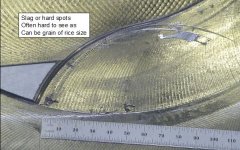Joe Miranda
Titanium
- Joined
- Oct 19, 2004
- Location
- Elyria Ohio
I have had trouble a couple of times with what I believe to be bad batches of bandsaw blades. I usually order 6 or 10 at a time. Both times this has happened it has been Morse blades (so not off brand). Today I was cutting some 1018. My cutting speed was 80-90 sfm - so pretty conservative. The diameter of the bar was 3-1/2" and I was about 3/8" into the cut when I heard a tooth let go and it stripped a pretty good section of the blade. I stopped, moved the workpiece to a fresh place, took the coolant blocks off and cleaned them and made sure everything looked good and started the cut again. Cut fine for about 1/2" (except for the stripped section which I was babying through the cut) and same thing - a tooth let go and it stripped another foot of blade.
Got a new blade (same batch) moved the workpiece to a fresh place to start the cut - half an inch away - turned the speed down to 60 sfm and started again - same thing. Lost a tooth, stripped another section. Now I'm mad. These blades ain't cheap - 1" wide x .035 x 10' 6" long - about $40 ea or so. That was the second blade in the box so I'm thinking just maybe I had two bad blades. Switched blades again, took the 3 1/2" bar out and put in a bar of 2" dia 1018 and tried again. I made it through the cut but it did not sound good - sounded like it was on the verge of loosing another tooth.
Plain carbon raker blades. Ever have this?
Got a new blade (same batch) moved the workpiece to a fresh place to start the cut - half an inch away - turned the speed down to 60 sfm and started again - same thing. Lost a tooth, stripped another section. Now I'm mad. These blades ain't cheap - 1" wide x .035 x 10' 6" long - about $40 ea or so. That was the second blade in the box so I'm thinking just maybe I had two bad blades. Switched blades again, took the 3 1/2" bar out and put in a bar of 2" dia 1018 and tried again. I made it through the cut but it did not sound good - sounded like it was on the verge of loosing another tooth.
Plain carbon raker blades. Ever have this?


